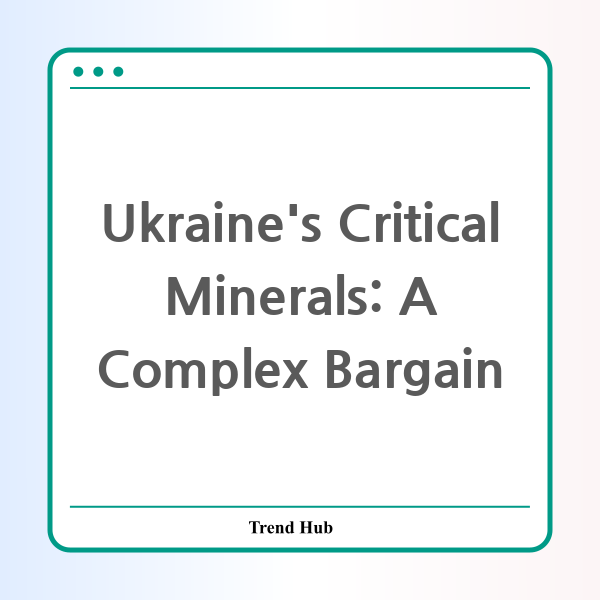* This website participates in the Amazon Affiliate Program and earns from qualifying purchases.

As the geopolitical landscape shifts dramatically, especially in the wake of the ongoing conflict in Ukraine, critical minerals have become a pivotal topic of discussion. With President Volodymyr Zelenskyy recently waving away the first US offer for these minerals, the implications could shape not just Ukraine's economy but the global mineral market.
What does this mean for Ukraine, the US, and the rest of the world?
At the heart of the matter is the vast wealth of critical minerals residing in Ukraine. Among these are rare earth minerals, titanium, uranium, and lithium, all of which are essential for modern technology and defense capabilities. The US's interest in these resources stems not only from their potential profitability but also from a strategic desire to limit dependency on countries like China, which has a dominant hold on rare earth materials.
Recently, a draft agreement was presented to Ukraine by US Treasury Secretary Scott Bessent. However, Zelenskyy has voiced significant concerns about the deal, primarily centered around security guarantees. He emphasizes the need for a partnership where both nations could benefit, stating, "Help us defend this, and we will make money on this together." Without solid security commitments from the US, Zelenskyy believes that the proposed economic treaty lacks validity.
Moreover, the discussions have been complicated by the ongoing conflict. Much of Ukraine's critical mineral resources are located in territories currently under Russian control. Zelenskyy has raised this crucial point, questioning whether it is reasonable to discuss these assets without addressing their status: "Is it to give to him?" He insists that there needs to be clarity on how to deal with the areas and resources which Russia has occupied.
The response from the US has been a bit alarming as well. Reports suggest that Washington expects repayment for the substantial financial support provided to Ukraine throughout the ongoing war. National Security Advisor Michael Waltz has echoed this sentiment, indicating that the bargain involves a significant portion—up to 50%—of Ukraine's future mineral reserves in exchange for continued support. This comes on the heels of former President Trump's claim that Ukraine should pay back the equivalent of $500 billion in rare earths, given the massive financial aid received thus far.
As the situation evolves, conversations between US and Russian officials continue, aimed at reaching a ceasefire. However, amid diplomatic chaos, it's paramount for European nations and Ukraine to assert their involvement in the negotiations. The European defense powers must unite to ensure their voices are heard, especially since they have been directly affected by the sanctions imposed on Russia.
The stakes are high, not just for Ukraine but for the broader global economy. The demand for critical minerals is ever-increasing due to the surge in technology and renewable energy applications. The resolution of Ukraine’s mineral wealth could redefine economic alliances and dependencies.
As we navigate this complex scenario, one thing remains clear: the dialogue surrounding Ukraine’s minerals is more than just an economic discussion; it’s a chess game with national security implications at every turn. The coming weeks will be critical as the world watches how these negotiations unfold and what impact they will have on the future of Ukraine and its resources.
In conclusion, the interplay of politics and minerals is transforming the way we view international relations, with Ukraine standing at the crossroads. Will the pursuit of critical minerals bring unity or division? Only time will tell.
* This website participates in the Amazon Affiliate Program and earns from qualifying purchases.